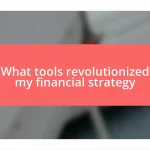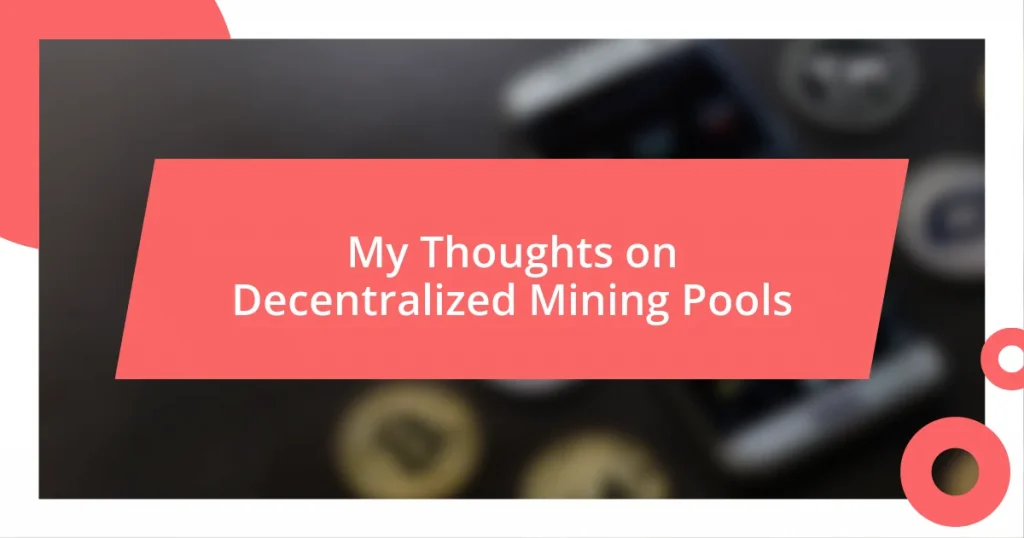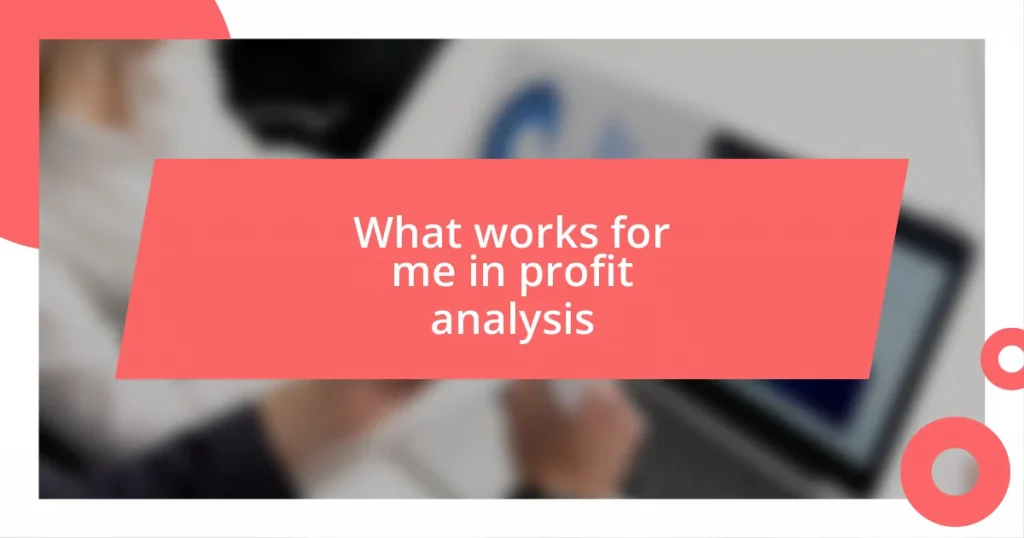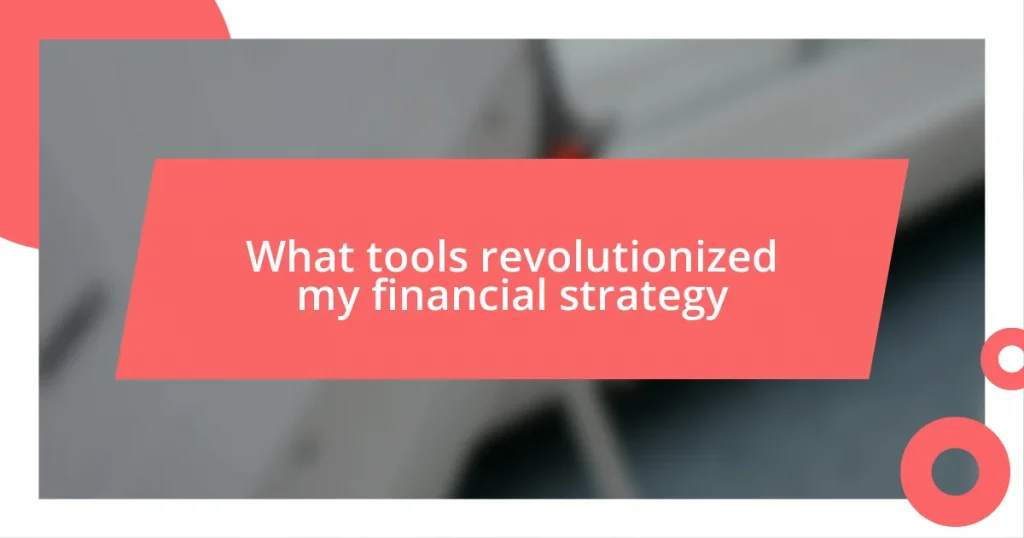Key takeaways:
- Decentralized mining pools promote collaboration among miners, enhancing fairness and resilience against centralized control, which can lead to more consistent rewards.
- While offering advantages such as democratized rewards and increased security, decentralized mining pools also face challenges like low efficiency, uneven power distribution, and coordination issues.
- Future trends include enhanced community governance, the integration of AI for improved mining strategies, and a focus on environmental sustainability, potentially reshaping the mining landscape.

Understanding Decentralized Mining Pools
When I first stumbled on decentralized mining pools, I was fascinated by the concept of collaboration in a space often dominated by individualism. In a decentralized mining pool, miners share their computational resources and rewards. This collective effort not only balances the risks of fluctuating mining difficulties but also adds a layer of resilience against centralized control.
I remember joining a small decentralized pool early in my mining journey. It felt empowering to see my contributions merge with others, creating something much larger than myself. Isn’t it interesting how such collaboration can lead to more consistent rewards for all involved? This community-driven approach can level the playing field, allowing even small miners to compete against the larger entities.
What truly excites me is the way decentralized mining pools embody the ethos of blockchain technology. Here’s a thought: in a world where many systems are shifting towards centralization, doesn’t it feel reassuring to engage in something that prioritizes fairness and inclusivity? By being part of a decentralized structure, we not only contribute our resources but also become part of a movement challenging the status quo.
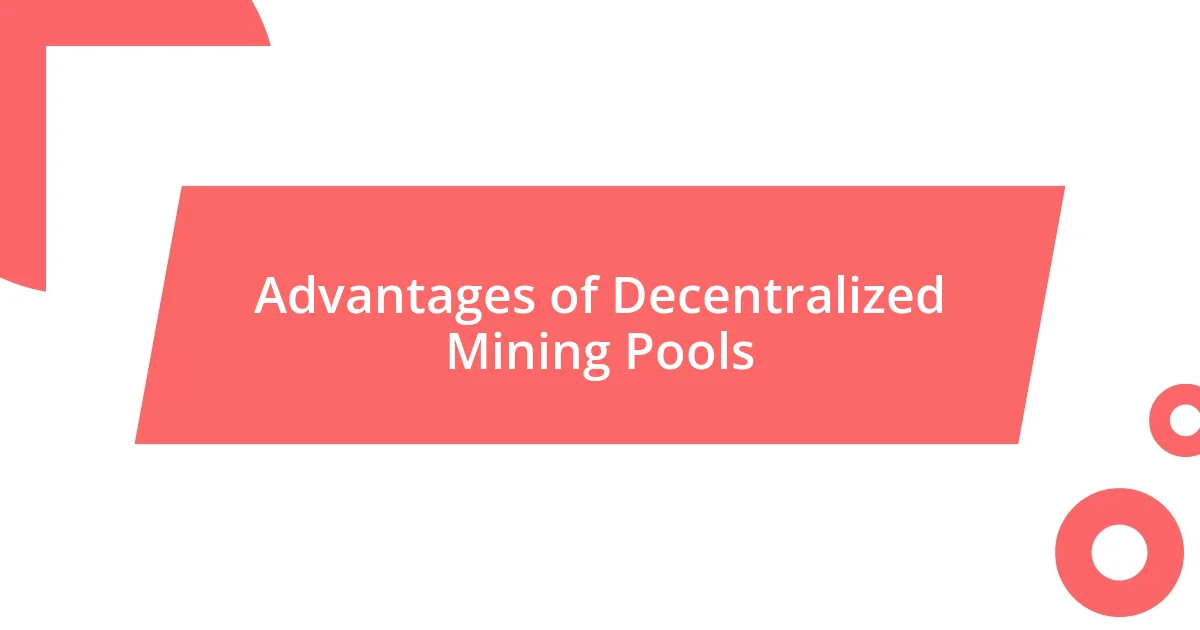
Advantages of Decentralized Mining Pools
The beauty of decentralized mining pools lies in their ability to democratize the mining process. When I first joined one, I experienced a sense of belonging that was hard to find in traditional settings. Every miner, whether big or small, has an equal stake in the rewards, promoting fairness in an otherwise competitive space. I can’t help but think how much this aspect fosters community and collaboration, making it feel less like a race and more like a joint adventure.
Another advantage that stands out to me is the increased security they provide. By dispersing the control across multiple participants rather than entrusting it to a single entity, the risk of attacks or hacking is minimized. Personally, this gives me peace of mind, knowing that my efforts are part of a well-distributed network rather than a singular target. The thought of being involved in a system designed to withstand centralized vulnerabilities is, in my opinion, one of the key strengths of decentralized mining pools.
Finally, the adaptability of decentralized pools is worth highlighting. They can quickly respond to changes in market conditions or mining difficulties. In my experience, this flexibility enhances the potential for stable earnings. I recall a moment when my original mining approach was struggling due to unexpected market fluctuations, but switching over to a decentralized pool brought back that sense of control and resilience I was looking for.
| Advantage | Description |
|---|---|
| Fairness | Every miner shares rewards proportionately, promoting inclusivity. |
| Security | Dispersed control reduces the risk of attacks or hacks. |
| Adaptability | Quick response to market changes enhances stability. |
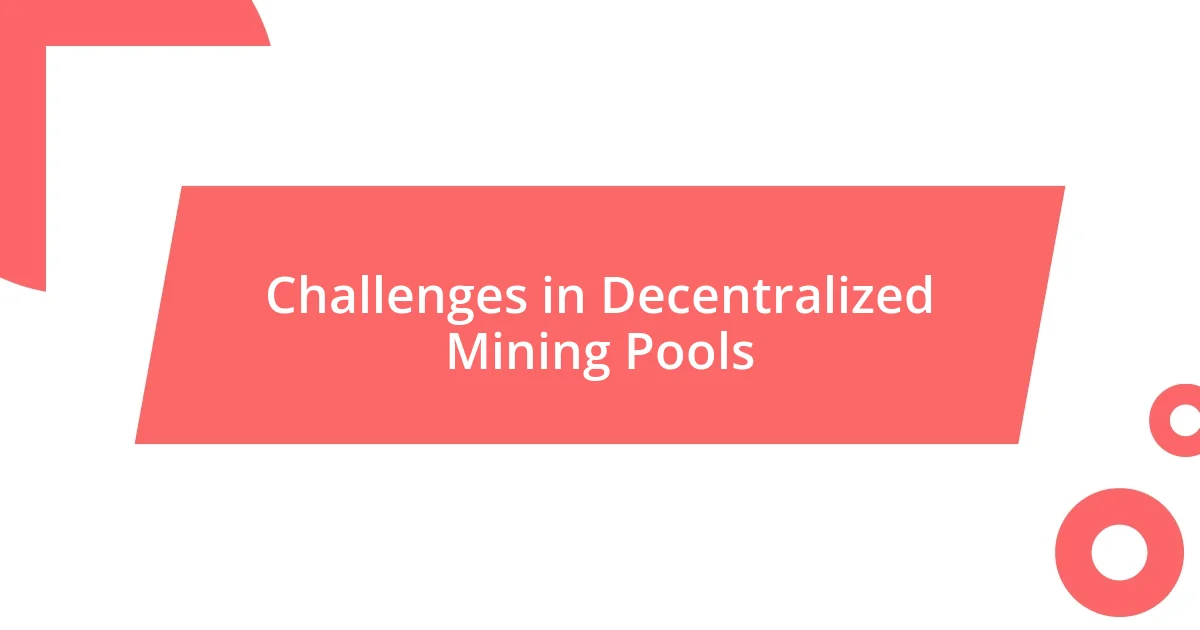
Challenges in Decentralized Mining Pools
Decentralized mining pools, while revolutionary, face notable challenges that can impact their effectiveness. One significant concern is the potential for low efficiency. As I’ve noticed in my own experience, smaller miners might not provide enough computational power to solve blocks efficiently, leading to irregular payouts. This feeling of uncertainty can be discouraging; I still remember nights when I eagerly refreshed my dashboard, hoping for just a small reward.
Here are some challenges that arise within decentralized mining pools:
- Uneven Distribution of Power: Some miners may dominate the pool, causing larger rewards to be concentrated in a few hands.
- Coordination Issues: With so many participants, it can become difficult to manage communication and consensus effectively, creating decision-making bottlenecks.
- Rewards Fluctuation: Because payouts are based on contributions, a drop in mining power can lead to volatility, leaving miners at the mercy of market conditions.
- Technical Barriers: Not everyone has the same level of technical expertise, which can lead to confusion or misconfigurations within the pool.
Further complicating the landscape, the lack of central leadership can sometimes result in conflicts over pool governance. I’ve learned that navigating these challenges requires patience and adaptability—qualities all miners must cultivate in a decentralized environment. When contending with these hurdles, I often remind myself of the philosophical underpinnings of decentralization: while the journey can feel unpredictable, the principle of collective achievement resonates deeply within me.
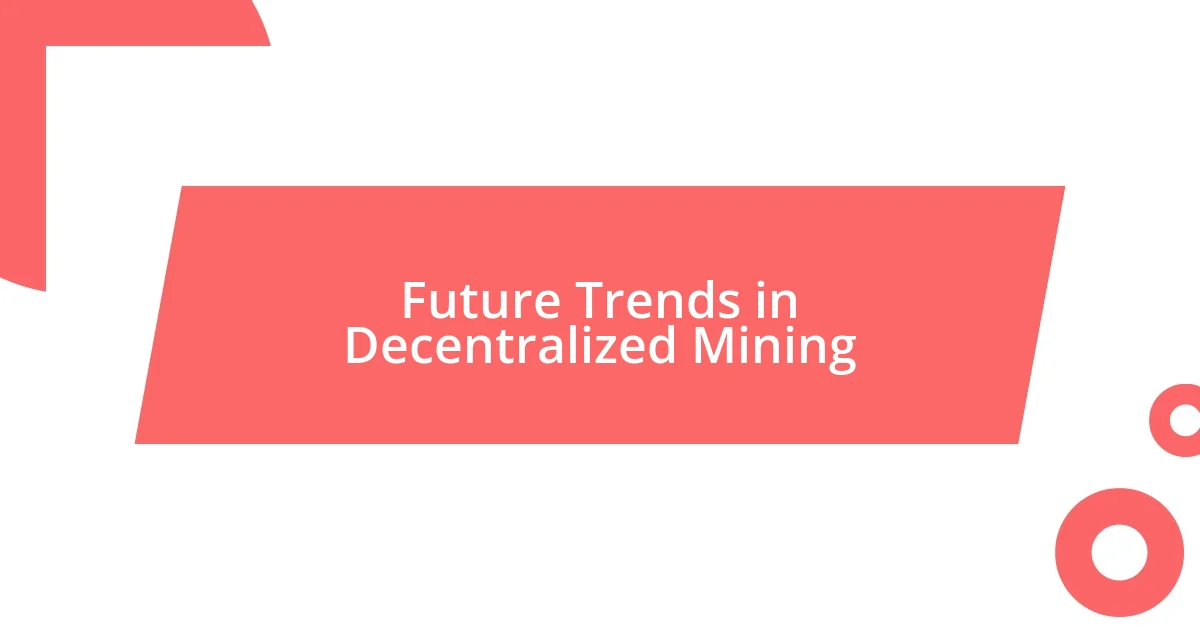
Future Trends in Decentralized Mining
Looking ahead, I see a significant shift towards enhanced community governance in decentralized mining pools. It’s fascinating to think that as more miners collaborate, they may develop unique mechanisms to make decisions collectively. I remember a discussion in a mining forum where we imagined a scenario where miners could vote on protocol changes, and the excitement in that conversation was palpable. Isn’t it intriguing to consider how such transparency could empower participants, fostering a sense of ownership and responsibility?
Moreover, the integration of artificial intelligence (AI) and machine learning is on the horizon. I can’t help but wonder—how will these technologies reshape our mining strategies? I’ve seen some early applications where algorithms calculate optimal mining configurations based on historical data. It made me realize the potential these innovations have to revolutionize efficiency while reducing energy consumption. The mere thought of leveraging technology to make informed decisions gives me an optimistic outlook for the future of decentralized mining.
Finally, I anticipate that environmental sustainability will become a focal point in the evolution of mining pools. As I reflect on my own experiences, I’ve felt the weight of responsibility for our planet. Many miners are already seeking greener alternatives, like utilizing renewable energy sources. What if future decentralized pools made eco-friendly practices a core principle? It’s an inspiring vision that could redefine how we approach mining, ensuring that our passion doesn’t come at a cost to the environment.
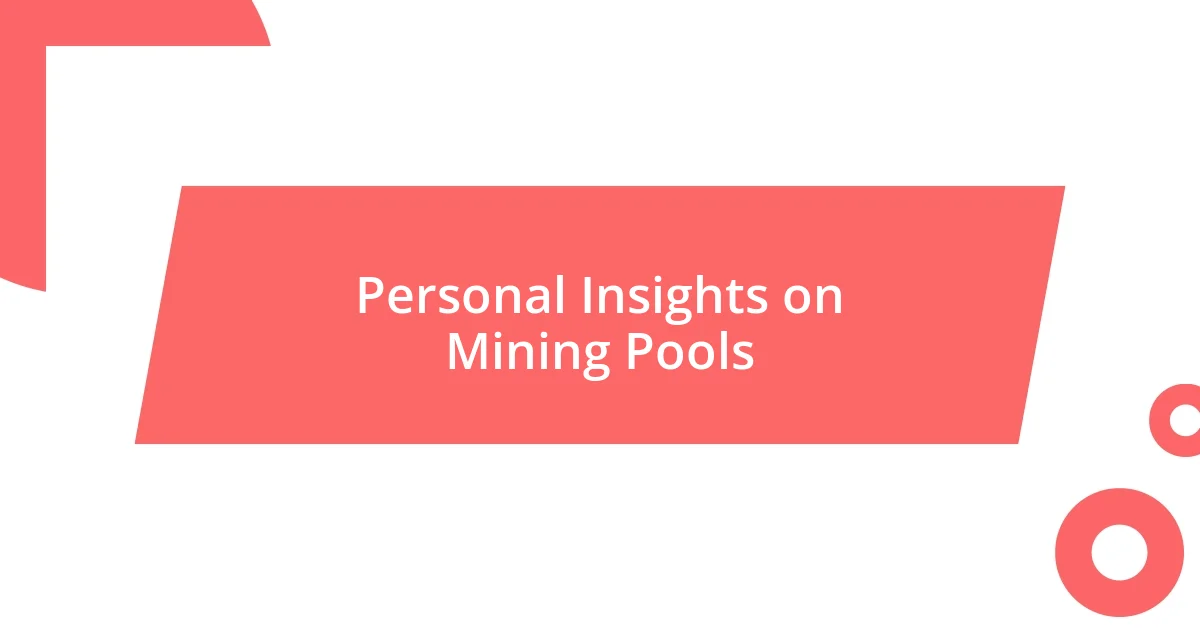
Personal Insights on Mining Pools
I find that mining pools can feel like a double-edged sword. On one hand, collaborating with others amplifies the chances of earning rewards, but on the other hand, it’s tough to shake off the feeling of being just a tiny cog in a vast machine. I remember joining a pool where my contributions felt negligible, almost like I was throwing pennies into a well and waiting for someone to hear my wish. Have you ever felt that way, wondering if your efforts are truly making an impact?
Another aspect that often bubbles to the surface of my mind is the social element of mining pools. While we’re all there for the common goal of reward, the opportunity to connect with fellow miners brings a sense of camaraderie. I once engaged in a heated debate with pool members over the best mining software—each of us passionately defending our choices. That exchange not only strengthened my understanding of the technology but also left me feeling like I was part of something bigger, a community striving for shared success.
Then there’s the constant balancing act between risk and reward. I’ve frequently wrestled with deciding how much hashing power to contribute. It’s a bit like playing poker; sometimes, you need to raise the stakes to see what you can win, but that risk can lead to significant losses too. Reflecting on those moments, I often ask myself, “Am I playing it too safe, or should I dive in headfirst?” It’s this dynamic tension that keeps me engaged, as each decision shapes my journey in the decentralized mining landscape.


